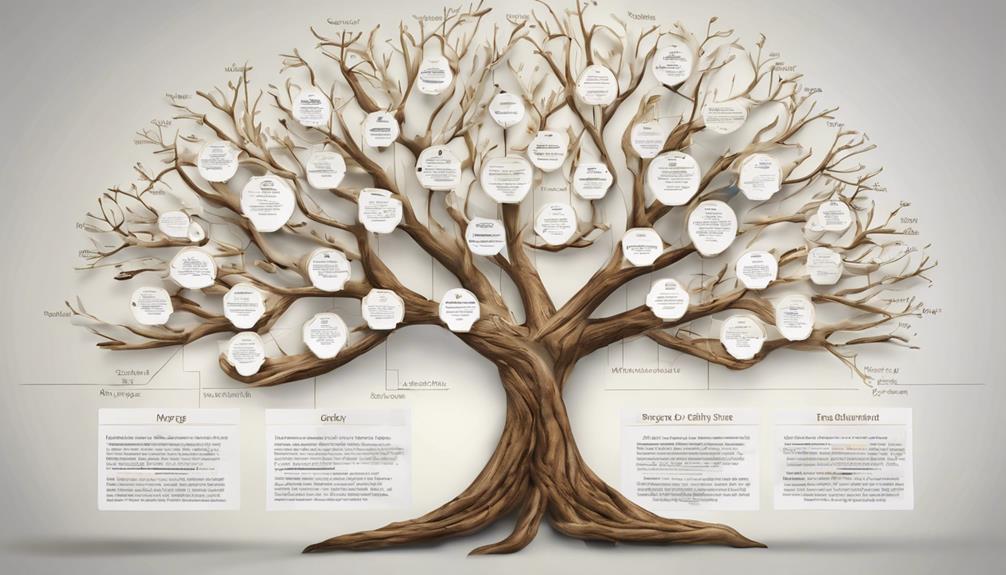As we delve into the intricate realm of Alzheimer’s genetics, we find ourselves pondering the age-old question: is Alzheimer’s hereditary?
The intricate web of genetic risk factors intertwined with familial and sporadic cases of the disease paints a complex picture.
While some may believe that family history plays a significant role in Alzheimer's development, the truth behind the hereditary nature of this condition often raises more questions than answers.
Join us as we unravel the mysteries surrounding Alzheimer's heredity and its implications.
Key Takeaways
- APOE gene ε4 variant increases Alzheimer's risk significantly.
- Early-onset Alzheimer's linked to genetic mutations, progresses rapidly.
- Familial Alzheimer's risk influenced by specific genetic mutations.
- Genetic counseling crucial for understanding and managing hereditary Alzheimer's risk.
Understanding Alzheimer's Genetics

Alzheimer's genetics play a crucial role in determining an individual's susceptibility to developing the disease. Research indicates that certain genetic factors can significantly increase the risk of developing Alzheimer's. One of the most well-known genetic risk factors is the presence of the APOE gene, specifically the ε4 variant. Individuals who inherit one copy of the APOE ε4 allele from a parent have an increased risk of developing Alzheimer's, while those who inherit two copies have an even higher risk.
Moreover, mutations in genes such as APP, PSEN1, and PSEN2 have also been linked to early-onset Alzheimer's disease, which manifests before the age of 65. These mutations can disrupt the normal functioning of proteins involved in the processing of amyloid beta, leading to the accumulation of plaques in the brain, a hallmark of Alzheimer's disease.
Understanding these genetic factors is crucial for early detection and personalized treatment strategies for individuals at risk of developing Alzheimer's. By studying the intricate interplay between genetics and Alzheimer's disease, researchers aim to develop targeted therapies that can delay or prevent the onset of this devastating condition.
Genetic Risk Factors for Alzheimer's

When examining the genetic risk factors for Alzheimer's, we must consider the increased likelihood of developing the disease within families with a history of Alzheimer's, known as familial Alzheimer's risk.
Additionally, the presence of the Apoe4 gene has been strongly linked to an elevated risk of developing Alzheimer's disease.
Early onset Alzheimer's poses a particular concern, as it can be associated with specific genetic mutations that accelerate the disease's progression.
Familial Alzheimer's Risk
In families with a history of Alzheimer's disease, genetic risk factors play a significant role in determining the likelihood of developing the condition. Research has shown that certain genes can increase the susceptibility to Alzheimer's within families. Understanding these genetic risk factors is crucial for both prevention and early detection of the disease.
Genetic mutations in genes such as APP, PSEN1, and PSEN2 have been linked to familial Alzheimer's disease. Familial Alzheimer's tends to have an earlier onset than sporadic cases of the disease. Genetic counseling can help individuals with a family history of Alzheimer's understand their risk and make informed decisions about their health.
Apoe4 Gene Connection
Researchers have identified a strong connection between the Apoe4 gene and an increased risk of developing Alzheimer's disease. This gene plays a critical role in the regulation of cholesterol in the brain and is associated with the accumulation of beta-amyloid plaques, a hallmark of Alzheimer's.
Individuals who inherit one copy of the Apoe4 gene from a parent have a higher risk of developing the disease, while those with two copies face an even greater risk. Understanding the Apoe4 gene's influence on Alzheimer's risk is vital for early detection and personalized interventions.
Screening for this gene variant can help identify individuals who may benefit from lifestyle modifications or early treatment strategies to potentially delay or mitigate the onset of Alzheimer's symptoms.
Early Onset Concerns
Our exploration of genetic risk factors for Alzheimer's disease continues with a focus on the concerning implications of early onset concerns in individuals with predispositions like the Apoe4 gene. Research indicates that early onset Alzheimer's, occurring before age 65, is often linked to genetic mutations and can progress more rapidly than late-onset forms. Understanding the genetic underpinnings of early onset Alzheimer's is crucial for developing effective prevention and treatment strategies.
- Early onset Alzheimer's is relatively rare but tends to have a higher genetic component.
- Individuals with a family history of early onset Alzheimer's may have a higher likelihood of developing the disease.
- Genetic testing can help identify predispositions for early onset Alzheimer's, allowing for proactive interventions and personalized care plans.
Familial Vs. Sporadic Alzheimer's Cases

When considering Alzheimer's disease, it's crucial to distinguish between familial and sporadic cases.
Familial Alzheimer's is linked to specific genetic mutations inherited from family members, increasing the risk of developing the disease.
On the other hand, sporadic Alzheimer's cases occur without a clear genetic pattern, highlighting the complex interplay of genetic and environmental factors in the onset of the condition.
Genetic Vs. Non-Genetic Alzheimer's
In understanding Alzheimer's disease, it's crucial to differentiate between genetic and non-genetic forms, known as familial and sporadic cases, respectively. Genetic Alzheimer's, also called familial Alzheimer's, is caused by inherited genetic mutations, leading to early-onset symptoms. On the other hand, non-genetic Alzheimer's, known as sporadic Alzheimer's, develops later in life without a clear genetic link.
- Genetic Alzheimer's (Familial Alzheimer's)
- Caused by inherited genetic mutations
- Early-onset symptoms
- Non-Genetic Alzheimer's (Sporadic Alzheimer's)
- Develops later in life
- No clear genetic link
Inherited Risk Factors
Evidence suggests that familial Alzheimer's cases often exhibit a stronger genetic predisposition compared to sporadic Alzheimer's cases. Familial cases have a clear pattern of inheritance within families, while sporadic cases occur in individuals without a family history of the disease. Understanding these differences is crucial for early detection and intervention. To illustrate further, we present the following table comparing familial and sporadic Alzheimer's cases:
| Factor | Familial Alzheimer's Cases | Sporadic Alzheimer's Cases |
|---|---|---|
| Genetic Predisposition | High | Lower |
| Age of Onset | Earlier | Later |
| Family History | Present | Absent |
| Disease Progression | Potentially Faster | Varied |
This table underscores the importance of genetic factors in familial cases, highlighting the need for personalized approaches in Alzheimer's research and care.
Impact of Family History on Alzheimer's

While genetics play a significant role in the development of Alzheimer's disease, the impact of family history on an individual's risk can't be overlooked. Family history of Alzheimer's can increase the likelihood of developing the disease, indicating a potential hereditary component. Research suggests that individuals with a first-degree relative, such as a parent or sibling, who's been diagnosed with Alzheimer's are at a higher risk themselves. Understanding the influence of family history is crucial in assessing an individual's overall risk profile for Alzheimer's disease.
Impact of Family History on Alzheimer's Risk:
- Shared Genetic Variants: Certain genetic variants linked to Alzheimer's can be inherited within families, contributing to a higher risk for affected individuals.
- Environmental Factors: Families often share similar environments, lifestyles, and habits, which can influence the development of Alzheimer's disease.
- Health Monitoring: Regular health monitoring for individuals with a family history of Alzheimer's can aid in early detection and intervention, potentially slowing down the progression of the disease.
Genetic Counseling for Alzheimer's Risk

Our understanding of genetic counseling for assessing Alzheimer's risk has evolved significantly in recent years through advancements in genetic testing technologies. Genetic counseling plays a crucial role in helping individuals understand their risk of developing Alzheimer's disease based on their genetic makeup. Through genetic testing, individuals can gain insight into their genetic predisposition to the disease, allowing for better-informed decisions regarding their health and potential preventive measures. Below is a table illustrating the key aspects of genetic counseling for Alzheimer's risk:
| Genetic Counseling for Alzheimer's Risk | |
|---|---|
| Role | Providing guidance and education on genetic risk factors |
| Benefits | Understanding individual risk and making informed decisions |
| Process | Genetic testing, family history evaluation, risk assessment |
Genetic counselors work closely with individuals to interpret genetic test results, evaluate family history, and assess the overall risk of developing Alzheimer's disease. This personalized approach empowers individuals to take proactive steps towards managing their health and potentially delaying the onset of Alzheimer's.
Hereditary Patterns of Alzheimer's Disease

Research has identified distinct hereditary patterns associated with Alzheimer's disease. While the exact cause of Alzheimer's remains unknown, genetic factors play a significant role in its development.
Here are some key points to understand the hereditary patterns of Alzheimer's disease:
- Early-Onset Familial Alzheimer's Disease (EOFAD): This rare form of Alzheimer's is inherited in an autosomal dominant pattern, meaning that a mutation in a single gene from one parent can cause the disease. Individuals with EOFAD typically develop symptoms before the age of 65.
- Late-Onset Alzheimer's Disease (LOAD): This is the most common form of Alzheimer's, usually occurring after the age of 65. While genetics play a role in LOAD, it's a complex interplay of multiple genes and environmental factors.
- APOE Gene: The APOE gene is the strongest genetic risk factor for LOAD. Variants of this gene, particularly the ε4 allele, increase the risk of developing Alzheimer's disease.
Understanding these hereditary patterns can help individuals and families make informed decisions about their health and potential risk factors for Alzheimer's disease.
Identifying Alzheimer's Risk in Families

Identifying Alzheimer's risk in families involves recognizing and understanding the hereditary patterns associated with the disease. By studying familial history and observing commonalities among affected individuals, healthcare providers can better assess the likelihood of Alzheimer's development within a particular family. Here, we present a table illustrating key factors that can help identify Alzheimer's risk within families:
| Risk Factor | Description |
|---|---|
| Genetic mutations | Inherited changes in specific genes can increase susceptibility to Alzheimer's. |
| Age | Advanced age is a primary risk factor for developing Alzheimer's. |
| Lifestyle choices | Factors like diet, exercise, and cognitive stimulation can influence risk. |
| Cardiovascular health | Conditions like hypertension may contribute to Alzheimer's risk. |
| Cognitive decline | Early signs of memory loss or cognitive impairment can indicate increased risk. |
Understanding these risk factors and how they manifest within family units can aid in early intervention and personalized care strategies for those at risk of developing Alzheimer's.
Genetic Testing for Alzheimer's Susceptibility

Genetic testing plays a crucial role in assessing an individual's susceptibility to Alzheimer's disease. By analyzing specific genes associated with the disease, healthcare providers can offer valuable insights into a person's risk of developing Alzheimer's. For individuals with a family history of the condition, genetic testing can provide a clearer understanding of their predisposition, enabling proactive steps to be taken towards prevention or early intervention.
Genetic Testing Benefits:
- Early Detection: Genetic testing can identify individuals at higher risk of developing Alzheimer's at an earlier stage, allowing for proactive health management.
- Informed Decision-Making: Understanding one's genetic predisposition empowers individuals to make informed decisions about their health and lifestyle choices.
- Targeted Interventions: Individuals with a higher genetic risk can benefit from targeted interventions and personalized treatment plans to potentially delay or mitigate the onset of Alzheimer's symptoms.
Managing Hereditary Alzheimer's Risk

To effectively manage the risk of hereditary Alzheimer's, understanding the role of lifestyle factors is crucial. Research suggests that adopting a healthy lifestyle can help reduce the risk of developing Alzheimer's disease, especially in individuals with a family history of the condition. Regular physical exercise, maintaining a balanced diet rich in antioxidants and omega-3 fatty acids, engaging in mentally stimulating activities, and getting an adequate amount of quality sleep are all important factors in managing hereditary Alzheimer's risk.
Furthermore, staying socially active and maintaining strong social connections can also play a significant role in lowering the risk of developing Alzheimer's. Studies have shown that individuals who are socially engaged and have robust support systems tend to have better cognitive function and a reduced risk of cognitive decline.
In addition to lifestyle factors, staying informed about the latest research and advancements in Alzheimer's prevention and treatment can also be beneficial in managing hereditary Alzheimer's risk. By staying proactive and taking steps to prioritize brain health, individuals can potentially mitigate the impact of genetic predispositions to Alzheimer's disease.
Frequently Asked Questions
Can Alzheimer's Disease Skip a Generation in a Family With a History of the Condition?
Yes, Alzheimer's disease can skip a generation in a family with a history of the condition.
While genetic factors can increase the risk of developing Alzheimer's, the inheritance pattern is complex and not solely determined by a single gene.
Other influences, such as lifestyle and environmental factors, also play a role in the development of the disease.
Therefore, it's possible for Alzheimer's to skip a generation within a family.
Are There Any Lifestyle Factors That Can Increase the Risk of Developing Alzheimer's in Individuals With a Genetic Predisposition?
When considering lifestyle factors that may impact the risk of developing Alzheimer's in individuals with a genetic predisposition, we find that maintaining a healthy diet, engaging in regular physical activity, and staying mentally active can play crucial roles.
Research suggests that these behaviors can help support brain health and potentially reduce the risk of cognitive decline associated with Alzheimer's disease.
It's essential to adopt these habits to promote overall well-being and potentially mitigate genetic predispositions.
How Does Having a Family History of Alzheimer's Impact the Age of Onset for the Disease?
Having a family history of Alzheimer's can impact the age of onset for the disease. Research suggests that individuals with a genetic predisposition may experience symptoms earlier in life compared to those without a family history.
Factors such as specific genetic mutations or inheritance patterns can influence the timing of onset. Understanding one's familial risk can help individuals and healthcare providers better prepare for potential cognitive changes and plan appropriate interventions.
Are There Any Specific Genes That Are More Commonly Associated With Familial Alzheimer's Cases?
Yes, specific genes commonly associated with familial Alzheimer's cases include APP, PSEN1, and PSEN2. Mutations in these genes can significantly increase the risk of developing early-onset Alzheimer's disease. Researchers have found that these genes play a crucial role in the production of beta-amyloid proteins in the brain, which are known to accumulate and form plaques in Alzheimer's patients.
Understanding these genetic factors is vital for early detection and potential interventions.
Is It Possible for Someone to Develop Alzheimer's Without Any Known Family History of the Disease?
In some cases, individuals can develop Alzheimer's disease even without a known family history of the condition. This can occur due to a combination of genetic, environmental, and lifestyle factors that influence disease development.
Research suggests that while familial Alzheimer's is linked to specific genetic mutations, sporadic cases may arise from complex interactions between genetics and other risk factors.
Understanding these multifaceted influences is crucial for advancing Alzheimer's prevention and treatment.
Are Hereditary Factors Linked to Increased Risk of Dementia?
Research suggests that hereditary factors may indeed play a role in the increased risk of dementia. While lifestyle choices can also contribute, genetics cannot be ignored. As our understanding of this connection grows, initiatives like comprehensive dementia care renovations are becoming increasingly important for those affected by this condition.
Conclusion
In conclusion, as we delve deeper into the genetic complexities of Alzheimer's disease, it becomes evident that hereditary factors play a significant role in its development.
By understanding the hereditary patterns and familial risk associated with this debilitating condition, we can better identify and manage Alzheimer's risk within families.
Remember, when it comes to Alzheimer's genetics, knowledge is power – so arm yourself with information to navigate this genetic maze.









